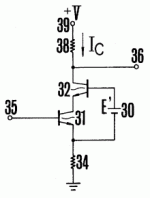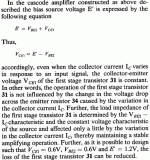I don't imagine you as a flaming threadster, Dimitri. Actually
I assumed that you confused the two different designs. I'm
perfectly proud to have designed something before Hawksford,
and less happy to have been anticipated by him on another.
If there is something else at issue, I think you should express it
here, and I doubt anyone will accuse you of flaming. 😎
I assumed that you confused the two different designs. I'm
perfectly proud to have designed something before Hawksford,
and less happy to have been anticipated by him on another.
If there is something else at issue, I think you should express it
here, and I doubt anyone will accuse you of flaming. 😎
It's hard to say without seeing the surrounding circuit in which the cascode is operating.Or perhaps even more interesting, why *any* cascode degrades the sound
It's a useful device for voltage/power shielding. Otherwise, hard to see how the benefits outweigh the cons in a typical power amp.
But the mathmatical analysis is fun for masochists and institutional types.
I agree Traderbam. I have found the exchange enlightning. I can't say anything negative about using cascodes, except for stage complication.
Ditto. I think that Charles was simply pointing out that they
are not always an effective solution. His point is correct,
(if that's what it was) but the discussion is/was much more
interesting than talking about wire. 😎
are not always an effective solution. His point is correct,
(if that's what it was) but the discussion is/was much more
interesting than talking about wire. 😎
For purposes of discussion, there is a tendency to take conceptual groups of devices and apply names to them. Thus, two devices may become a "differential" whereas a different arrangement of the same two devices becomes a "cascode." Purely as a descriptive convenience, we have agreed to call these "one gain stage."
Yet the signal still goes through two or more devices, each leaving its subtle fingerprint on the sound.
Grey
Yet the signal still goes through two or more devices, each leaving its subtle fingerprint on the sound.
Grey
traderbam said:(...)But the mathmatical analysis is fun for masochists and institutional types.
Philiosophical aside... - sorry!
Well, the cool thing about mathematics is that its goal is truth itself. This could be viewed as masochistic, since truth (in a mathematical sense) can often be very difficult to come by. But the alternative is ignorance. And I am definitely not of the Orwellian "Ignorance is strength" persuasion.
Referencing Grey:
I would agree with that as a perfect description.
No darlingtons allowed, though.... 😉
I would agree with that as a perfect description.
No darlingtons allowed, though.... 😉
andy_c said:Well, the cool thing about mathematics is that its goal is truth itself.
Very correct. but we are talking about audio here... 😉
Nelson Pass said:
Very correct. but we are talking about audio here... 😉
Let's just say that one non-audio comment leads to another. Or didn't you notice the first one?
Mr. Pass, does Complacency come with age? It seems You've spent a better part of your life trying to perfect upon a given Topology,to extract that little bit of performance from existing circuitry, Cascoding, Variable Bias, Super Symmetry, Etc,claiming patents and such, stating the benefits of each new idea. But You've seemed to revert to an earlier time when all was well, or so they thaught. Have you discovered that all Your Earlier work was in vain? Maybe you,ve jumped the gun on a lot of theories? Or is (simple) convienient for today?
aside myself

Interesting. I'd say a subject like physics is more akin to seeking truths. I consider mathematics to be more of a modelling system when it comes to physical things. It is a set of contructs and relationships that can be used to predict real life behaviours. But mathematics doesn't exist as such - we humans just made it up. So I think it's truth comes from it's own definition: it is a set of rules that we say are true and therefore maths is true by definition QED, etc.the cool thing about mathematics is that its goal is truth itself

Symx,
What is old is new and.......................A short story
The First Principle
When one goes to Obaku temple in Kyoto he sees carved over the gate the words "The First Principle". The letters are unusually large, and those who appreciate calligraphy always admire them as being a mastepiece. They were drawn by Kosen two hundred years ago.
When the master drew them he did so on paper, from which the workmen made the large carving in wood. As Kosen sketched the letters a bold pupil was with him who had made several gallons of ink for the calligraphy and who never failed to criticise his master's work.
"That is not good," he told Kosen after his first effort.
"How is this one?"
"Poor. Worse than before," pronounced the pupil.
Kosen patiently wrote one sheet after another until eighty-four First Principles had accumulated, still without the approval of the pupil.
Then when the young man stepped outside for a few moments, Kosen thought: "Now this is my chance to escape his keen eye," and he wrote hurriedly, with a mind free from distraction: "The First Principle."
"A masterpiece," pronounced the pupil.
Regards,
Jam
What is old is new and.......................A short story
The First Principle
When one goes to Obaku temple in Kyoto he sees carved over the gate the words "The First Principle". The letters are unusually large, and those who appreciate calligraphy always admire them as being a mastepiece. They were drawn by Kosen two hundred years ago.
When the master drew them he did so on paper, from which the workmen made the large carving in wood. As Kosen sketched the letters a bold pupil was with him who had made several gallons of ink for the calligraphy and who never failed to criticise his master's work.
"That is not good," he told Kosen after his first effort.
"How is this one?"
"Poor. Worse than before," pronounced the pupil.
Kosen patiently wrote one sheet after another until eighty-four First Principles had accumulated, still without the approval of the pupil.
Then when the young man stepped outside for a few moments, Kosen thought: "Now this is my chance to escape his keen eye," and he wrote hurriedly, with a mind free from distraction: "The First Principle."
"A masterpiece," pronounced the pupil.
Regards,
Jam
GRollins said:Darlington is a town not far away best known for its racetrack...and little else.
Grey
and drug busts too.
Re: aside myself
Yes, mathematics is an axiomatic system, where we have choosen
the axioms and can choose other axioms at will, if we wish, but
this is precisely why there can be a truth in mathematics. We can
never have absolute truth in the same sense in physics, chemistry,
medicine or anything studying the real world. In mathematics we
can claim things to be true or false without resorting to degrees
of confidence etc. etc. As soon as we apply mathematics to some
other area like physics, it becomes a tool and it cannot tell any
such absolute truth about the physics. Actually, even if some
people think it is pointless to study such truths within an
axiomatic system, it is quite useful to know such properties
about the system. When we apply mathematics as a tool we
don't have to question the tool, since its properties are known.
It would make life harder if we had to question not only if
Ohms law applies in a certain case but also had to question
the mathematics we use for the calculation. It would also be
difficult if we couldn't know for sure that 1000nF is always 1uF.
traderbam said:
Interesting. I'd say a subject like physics is more akin to seeking truths. I consider mathematics to be more of a modelling system when it comes to physical things. It is a set of contructs and relationships that can be used to predict real life behaviours. But mathematics doesn't exist as such - we humans just made it up. So I think it's truth comes from it's own definition: it is a set of rules that we say are true and therefore maths is true by definition QED, etc.

Yes, mathematics is an axiomatic system, where we have choosen
the axioms and can choose other axioms at will, if we wish, but
this is precisely why there can be a truth in mathematics. We can
never have absolute truth in the same sense in physics, chemistry,
medicine or anything studying the real world. In mathematics we
can claim things to be true or false without resorting to degrees
of confidence etc. etc. As soon as we apply mathematics to some
other area like physics, it becomes a tool and it cannot tell any
such absolute truth about the physics. Actually, even if some
people think it is pointless to study such truths within an
axiomatic system, it is quite useful to know such properties
about the system. When we apply mathematics as a tool we
don't have to question the tool, since its properties are known.
It would make life harder if we had to question not only if
Ohms law applies in a certain case but also had to question
the mathematics we use for the calculation. It would also be
difficult if we couldn't know for sure that 1000nF is always 1uF.
Are you suggesting people literally get on their high horse in Darlington?Darlington is a town not far away best known for its racetrack...and little else.
...and drug busts too.

- Status
- Not open for further replies.
- Home
- Amplifiers
- Solid State
- Another Zero Feedback Amplifier


